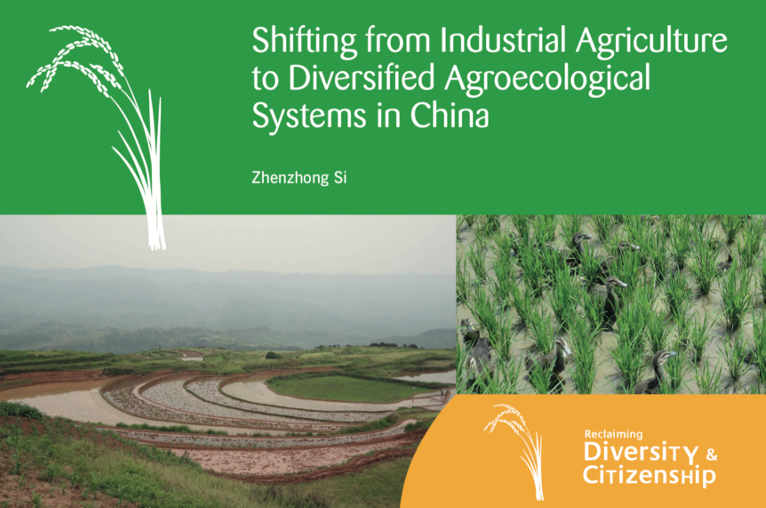This freshly published book (open access, free to download) offers a new perspective on how to shift from industrial agriculture to diversified Agroecological Systems in China and contributes to recent debates on agroecology transitions and transformation.
In 2008, China experienced its most severe food safety scandal—the melamine tainted milk that sickened 300,000 infants and killed several of them. This scandal culminated a series of other food safety scandals throughout the 2000s and had far-reaching impacts on China’s food sector beyond the dairy industry. Ever since, food safety has long been ranked one of the top public concerns in China. As a result, the way food is produced has garnered much attention not only among Chinese scholars but also among its practitioners:farmers and food activists.
Ecological agriculture – food production following the ecological principles with reduced or no use of chemicals – is being increasingly adopted by an emerging group of agricultural entrepreneurs [1]. Driven by consumer interest in safe and healthy food, various ecological food initiatives such as organic and “green” food companies, farmers’ cooperatives, community supported agriculture, and ecological farmers’ markets have been taking root in China in the past decade.

Figure 1 – Rice-duck ecological agriculture in Guangxi
Despite the proliferation of ecological food practices driven by the food safety concern, these initiatives are still at the very margin of China’s food system. After decades of modernization of its agricultural sector, most of China’s 200 million farming households nowadays are dependent upon industrial farming inputs, particularly commercial seeds and livestock breeds, synthetic fertilizer and chemical pesticides and herbicides.
Industrial farming, although in a very different sense from large-scale monoculture farming in the West, has resulted in serious ecological, social and health consequences, such as the degradation of agricultural resources, the deterioration of rural communities and the growing food related chronic diseases.
Thus, the challenges facing food producers are also beyond the food safety issue and expanding throughout its food system.The declining number and marginalization of farmers, the meatification of diet, and the significant amount of food waste, just to name a few, are also closely related to the industrialization of agriculture and its food system. It is thus urgent to rethink China’s agricultural sector in general and explore the potential to transform it into a diversified agroecological system.

Figure 2 – Farmers preparing vegetable shares for customers at a community supported agriculture farm in Nanjing
The International Panel of Experts on Sustainable Food Systems (IPES-Food) released a timely report in 2016 that examines the outcomes of industrial farming and diversified agroecological systems in the world and identified possible ways forward for a shift towards agroecology. The theorization of the sustainability transition of agriculture in the report greatly inspired me to examine parallel issues specific to China.
This book draws upon the framework of the IPES-Food report to review China’s current agricultural sector and the emerging agroecological initiatives and analyze how they are being shaped by China’s social, economic and political factors. Building on these understandings, the report proposes seven recommendations to promote the development of agroecological systems adapted to Chinese conditions. It provides a systematic overview of the current status and potential pathways forward for the development of ecological agriculture in China.
This publication is a part of the Reclaiming Diversity and Citizenship book series based on my long time research on China’s changing food system and the ecological agriculture sector in China with a research team at University of Waterloo.
“Agricultural entrepreneurs” here refers to an emerging group of entrepreneurs investing in ecological agriculture in the past decade or so. They usually rent land from farmers and hire farmers as farm workers. Some of them are driven by their agrarian dreams and have strong ecological values.





